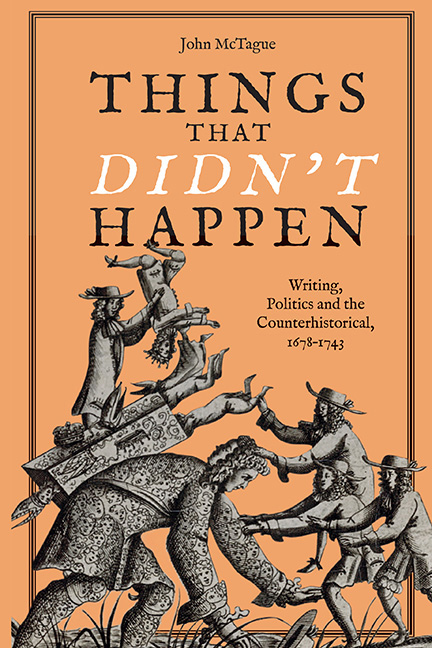Book contents
- Frontmatter
- Dedication
- Contents
- List of Illustrations
- Acknowledgements
- List of Abbreviations
- Introduction
- I Fabrications
- II Failures
- III Speculations
- 5 The Indifference of Number: The South Sea Bubble, 1720–21
- 6 ‘Some Convenient Order’: Mandeville, Berkeley, and the Narration of Ethical Exchange
- IV The Dunciads
- Conclusion: Events that Didn't Happen
- Bibliography
- Index
6 - ‘Some Convenient Order’: Mandeville, Berkeley, and the Narration of Ethical Exchange
from III - Speculations
Published online by Cambridge University Press: 09 October 2019
- Frontmatter
- Dedication
- Contents
- List of Illustrations
- Acknowledgements
- List of Abbreviations
- Introduction
- I Fabrications
- II Failures
- III Speculations
- 5 The Indifference of Number: The South Sea Bubble, 1720–21
- 6 ‘Some Convenient Order’: Mandeville, Berkeley, and the Narration of Ethical Exchange
- IV The Dunciads
- Conclusion: Events that Didn't Happen
- Bibliography
- Index
Summary
THE association of court Whigs with stockjobbing is enabled by a sensed connection between the troubling equivalence of imaginary property, and what is seen as a pernicious moral and epistemological relativism: the privileging of ends over means. These anxieties are bound up with the critiques of ‘freethinking’ in the early eighteenth century. Thinking about them in relation to this financial crisis reveals the historiographical dimension of both freethinking and the attempts to bring it to order. Bernard de Mandeville became a figurehead for the amorality associated with court Whigs. His most infamous work, The Fable of the Bees, is not about the South Sea Bubble in any straightforward sense, but it is dragged into the fray in its aftermath. The Fable first appeared in 1705 as The Grumbling Hive, an extended allegory in verse that declared that the private vices of the subject (avarice, prodigality, lust, and especially luxury) were actually beneficial to the commonwealth, stimulating manufacture and industry. In 1714, Mandeville published another edition of the poem, with new and extensive explanatory remarks on almost all of its lines. It is for these remarks – and not the ‘story told in Dogrel’ – that the text is remembered today, for it is here that Mandeville stakes out his political economics. The events of 1720 and the increased concentration on the ethics of investment gave new relevance to his theories, or made them more provocative. The 1723 reissue of The Fable led to an indictment by the Middlesex Grand Jury. For evidence that Mandeville was associated with the Bubble, we can return to William Bond's poem on the crisis:
Since as light Quibbling pass'd for Sterling Sense
Folly, that Vice may stand in its Defence,
Called Vices Virtues in its Venal Rhimes,
And turn'd Illustrious Virtues into Crimes
These lines link a perceived immorality propagated by Mandeville's political economics with the corrupt trade in imaginary property, a manipulation of value that led in turn to a corruption of language and the arts, making vice and virtue equivalent. Bond expresses horror at the idea that ‘fortune’ – as in both luck or outcome, and wealth – could ‘ligitimate [sic] deceit’ (p. 3).
- Type
- Chapter
- Information
- Things that Didn't HappenWriting, Politics and the Counterhistorical, 1678–1743, pp. 167 - 180Publisher: Boydell & BrewerPrint publication year: 2019



